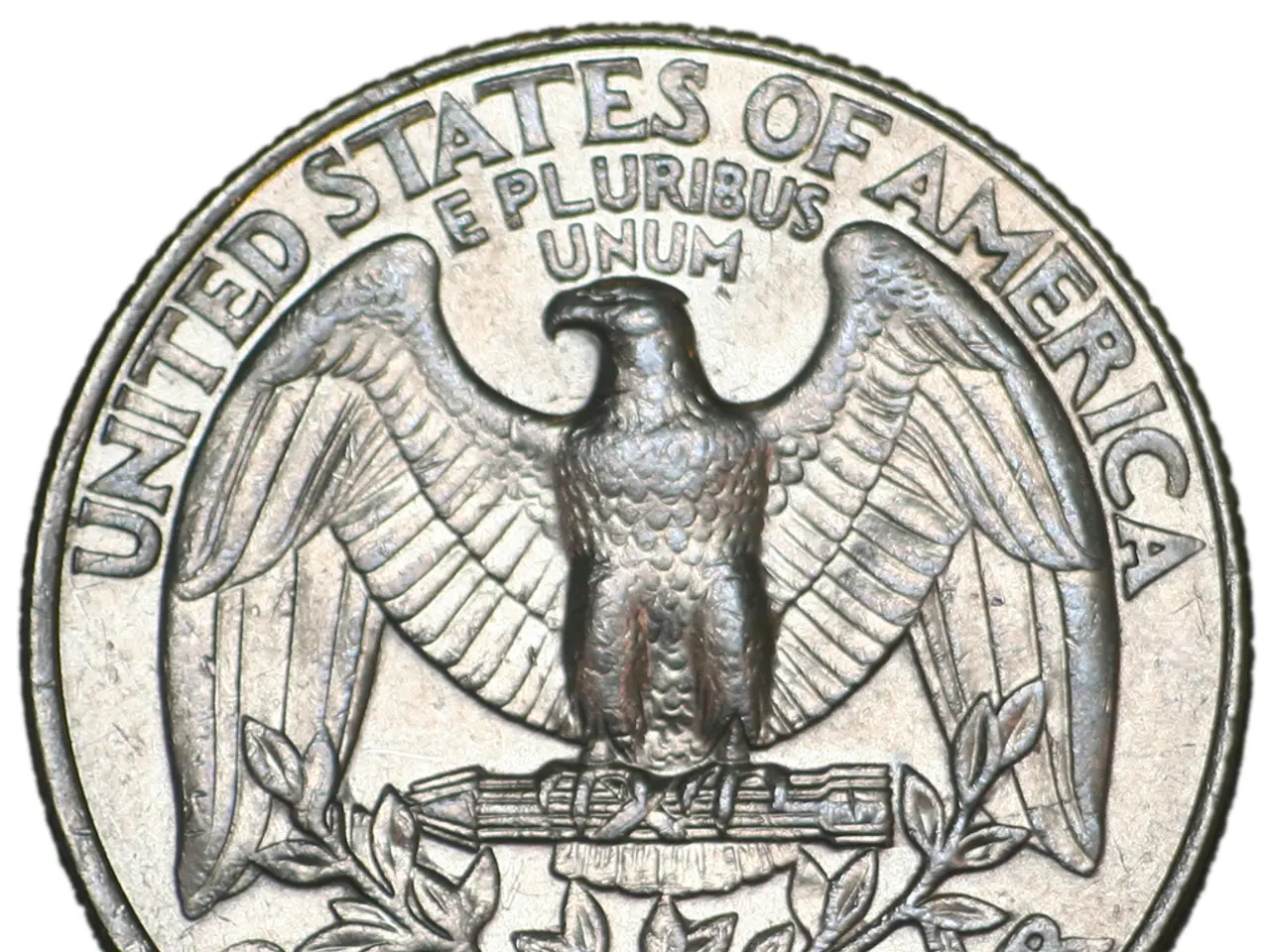Hayes Sells Ethereum, Forecasts $100,000 Bitcoin Amid Trade Tensions
Arthur Hayes, co-founder of BitMEX, has made a significant move in the crypto market by selling over $13 million in various digital assets and converting nearly $23 million into USDC stablecoin [1][2][3]. This strategic shift, rather than a mere tactical rebalancing, has raised eyebrows in the crypto community.
Hayes sold 2,373 Ethereum (ETH) worth approximately $8.32 million and 7.76 million ENA tokens worth around $4.62 million. He also disposed of 38.86 billion PEPE tokens, worth approximately $414,700 [1][2][3]. The transactions were executed on multiple platforms, including Uniswap, Flowdesk, and Binance, with most of the swaps appearing to have been executed through wrapped Ethereum pools [1].
Hayes' decision to sell could be a strategic move in anticipation of market changes, as he suggests that Bitcoin and Ethereum could become safe havens due to the global economy's slow credit creation [4]. He also reinforces growing concerns around global economic momentum and the crypto market's response to fiscal stressors [4]. However, his comment, "Back to the beach," suggests confidence in his thesis despite market volatility [5].
The move comes amid deteriorating global economic fundamentals, such as weak U.S. job growth, sluggish credit expansion across major economies, and upcoming geopolitical risks like U.S. tariffs in Q3 that could worsen risk sentiment [1][2][3]. Hayes predicts Bitcoin could test the $100,000 mark and Ethereum could target $3,000 amid these challenges, significantly below recent peaks [1][2][3].
By shifting a large portion of his portfolio into USDC, a stablecoin, Hayes is adopting a defensive position to preserve capital rather than just rebalancing between crypto assets, emphasizing a strategic move to mitigate exposure ahead of expected market turbulence [1][2]. This approach suggests Hayes is responding decisively to macroeconomic headwinds rather than engaging in routine portfolio adjustments.
Arthur Hayes will further elaborate on his views during his keynote at WebX Asia in Tokyo on August 25 [2]. His recent moves are being closely watched by analysts and investors alike, as they attempt to decipher the implications of his strategic repositioning in the current uncertain economic environment.
[1] Coindesk. (2023). Arthur Hayes Sells $13 Million in Crypto, Converts to Stablecoin. [online] Available at: https://www.coindesk.com/business/2023/08/01/arthur-hayes-sells-13-million-in-crypto-converts-to-stablecoin/
[2] Cointelegraph. (2023). Arthur Hayes to Speak at WebX Asia, Discusses Crypto Market Outlook. [online] Available at: https://cointelegraph.com/news/arthur-hayes-to-speak-at-webx-asia-discusses-crypto-market-outlook
[3] Decrypt. (2023). Arthur Hayes' Recent Crypto Sell-Off: A Strategic Shift or Simple Rebalancing? [online] Available at: https://decrypt.co/85546/arthur-hayes-crypto-sell-off-strategic-shift-simple-rebalancing
[4] Bloomberg. (2023). Hayes: Bitcoin, Ethereum Could Be Safe Havens Due to Global Economy's Slow Credit Creation. [online] Available at: https://www.bloomberg.com/news/articles/2023-07-28/hayes-bitcoin-ethereum-could-be-safe-havens-due-to-global-economy-s-slow-credit-creation
[5] Financial Times. (2023). Hayes: "Back to the Beach," Despite Market Volatility. [online] Available at: https://www.ft.com/content/895a413a-92b3-4f8e-8d23-8a2061a77c2d
- Arthur Hayes, co-founder of BitMEX, sold 2,373 Ethereum (ETH) worth approximately $8.32 million, 7.76 million ENA tokens worth around $4.62 million, and 38.86 billion PEPE tokens, worth approximately $414,700.
- He executed these transactions on multiple platforms, including Uniswap, Flowdesk, and Binance, with most of the swaps appearing to have been executed through wrapped Ethereum pools.
- By shifting a large portion of his portfolio into USDC, a stablecoin, Hayes is adopting a defensive position to preserve capital rather than just rebalancing between crypto assets.
- Analysts and investors are closely watching Hayes' recent moves as they attempt to decipher the implications of his strategic repositioning in the current uncertain economic environment.




